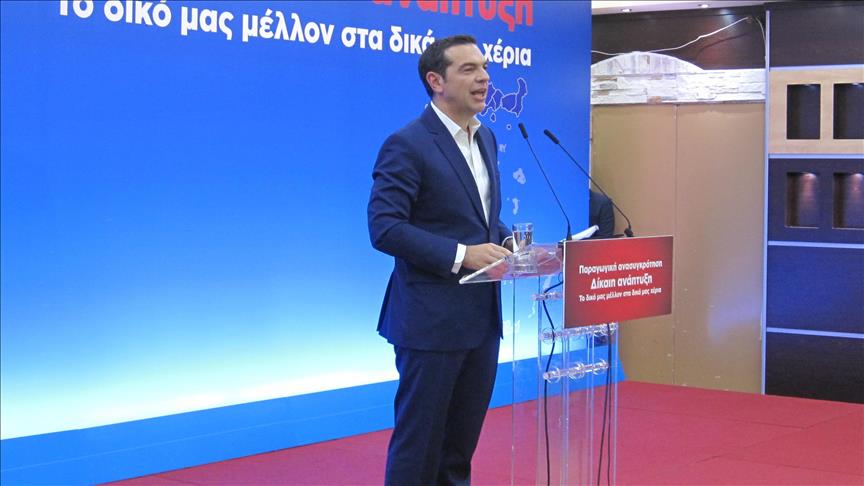 KOMOTINI, GREECE, NOV. 14: Greek Prime Minister Alexis Tsipras speaks in Komotini, Western Thrace, Greece on Nov. 14, 2017. He announces his government will submit draft legislation to parliament which will change some regulations regarding the application of Sharia law in Western Thrace
KOMOTINI, GREECE, NOV. 14: Greek Prime Minister Alexis Tsipras speaks in Komotini, Western Thrace, Greece on Nov. 14, 2017. He announces his government will submit draft legislation to parliament which will change some regulations regarding the application of Sharia law in Western Thrace
By Fatih Hafiz Mehmet
ANKARA
The Greek premier's announcement of changes regarding the application of Islamic law in country’s Western Thrace region has sparked controversy and claims that Sharia could be completely abolished.
Speaking to Anadolu Agency, Assist. Prof. Ali Huseyinoglu from Turkey's Trakya University Balkan Research Institute said Sharia is not being abolished by the new legislation which will be submitted to Greece’s parliament in the following days.
"The legislation was reflected wrongly in some Greek media. They claimed that Islamic law is being abolished in Greece, which is wrong. Sharia is not being abolished in Greece," Huseyinoglu said.
Instead, Huseyinoglu said, the new legislation deals only with a part of Islamic law in Greece.
Currently, if there is an objection regarding inheritance issues from family members they have to be judged by the mufti (Muslim cleric), which caused some unjust treatments, Huseyinoglu said.
Huseyinoglu said Islamic law in Greece is special legislation applied only in Western Thrace and it should not collide with the Greece’s general laws.
"There has been some anomalies regarding final decisions of muftis for many years," he said.
The new legislation tries to correct this situation, Huseyinoglu added.
Huseyinoglu said Islamic law is also present in the U.K., namely in Sharia tribunals, but it is not possible to take a decision there which is against British law.
Greek Prime Minister Alexis Tsipras announced on Tuesday his government will submit draft legislation to parliament which will change some regulations regarding the application of Sharia law in Western Thrace.
Western Thrace is home to a Muslim Turkish minority of around 150,000 people, where muftis have jurisdiction to decide on family and inheritance matters of local Muslims.
Tsipras said the new legislation will make the jurisdiction of the mufti optional. This will mean that in a case if all sides agree to be judged by the mufti, he will have the jurisdiction on that case.
However, if one of the sides declines to be judged by the mufti, that case will be brought before Greek civil courts.
Tsipras also said inheritance issues between members of the minority will be determined by Greek civil law and not Islamic law, if anyone does not choose Islamic law in a written document.
Sharia in Greece
Huseyinoglu stressed that the application of Sharia law in Western Thrace is a right and this right should not be taken from the hands of the minority.
"I do not expect that Sharia will be abolished completely in the near future," Huseyinoglu said.
He said Greece appoints muftis instead of letting locals to elect them.
"Greece only has one main reason to appoint muftis since 1991. Greek officials say 'because the mufti has judicial power we appoint our own official’", Huseyinoglu said.
He claimed if the judicial power of the mufti is abolished, there will be no other obstacle left for the locals to elect their mufti, which is not desired by Greece.
The mufti election issue has been a chronic problem of the Muslim Turkish minority since 1991.
The election of muftis by Muslims in Greece was regulated in the 1913 Treaty of Athens between Greece and the Ottoman Empire and was later included in the Greek Act 2345/1920.
However, Greece annulled this law in 1991 and started appointing the muftis itself.
The majority of Muslim Turks in Komotini (Gumulcine) and Xanthi cities do not recognize the appointed muftis and elect their own instead, who are not recognized by the Greek state.
Despite this situation, the appointed muftis in Western Thrace continue to have judicial powers on family and inheritance matters of local Muslims.
Anadolu Agency website contains only a portion of the news stories offered to subscribers in the AA News Broadcasting System (HAS), and in summarized form. Please contact us for subscription options.





